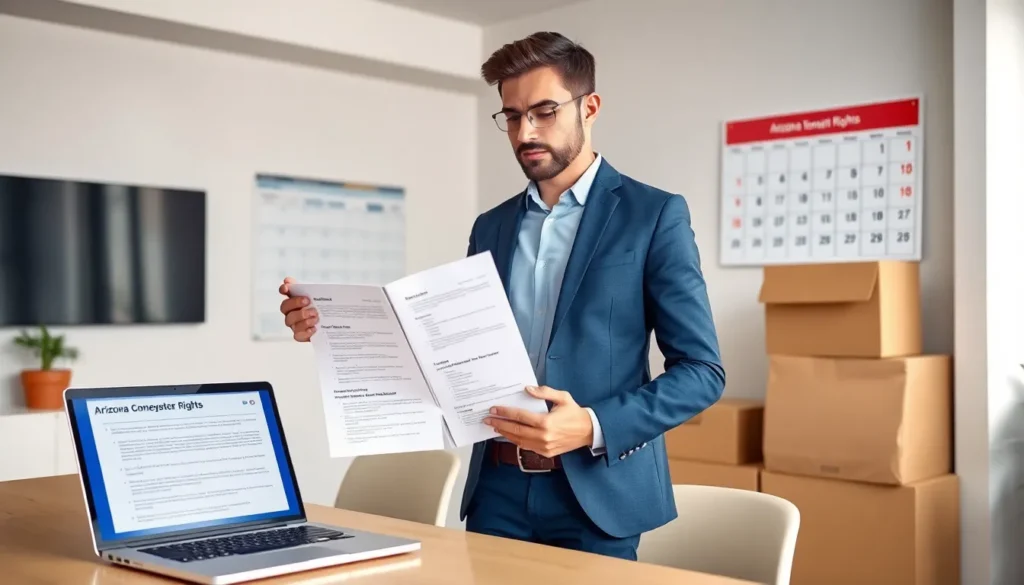Moving out can feel like an Olympic sport, except the gold medal is just your sanity. Tens of thousands navigate the maze of Arizona tenant rights each year, and let’s be honest: no one wants a surprise during a move. From understanding tenant rights to ensuring your security deposit doesn’t vanish into thin air, this guide has your back. So buckle up, grab your cardboard boxes, and let’s untangle the legal lingo together.
Understanding Tenant Rights in Arizona

In Arizona, tenants enjoy specific rights that can make their rental experience smoother and more secure. First and foremost, the law ensures that a tenant’s right to habitable housing stands firm. This means landlords must keep rental properties up to par, addressing essential repairs and maintenance issues timely. Also, tenants have the right to privacy: landlords cannot just waltz in whenever they feel like it. Instead, they must provide reasonable notice before entering a rental unit, typically 48 hours.
It’s crucial for tenants to familiarize themselves with these rights, not only to protect themselves but also to empower their decisions throughout the rental period. Understanding rights can deter abusive landlord behaviors and ensure fair treatment in all dealings.
Notice Requirements for Moving Out
When it’s time to move out, knowledge is power. Arizona law requires tenants to provide their landlords with written notice before moving out, typically 30 days. But, the exact requirements may vary based on the lease agreement, so it’s wise to double-check those fine print details.
In some cases, such as month-to-month leases, a written notice 30 days in advance is standard. For fixed-term leases, ensure that you know if you’re able to terminate early or if you must fulfill specific notices. Failing to provide appropriate notice may lead to complications, like unexpected charges.
Security Deposits and Return Procedures
Ah, the infamous security deposit. It can feel as elusive as a unicorn when moving out. In Arizona, landlords have 14 days to return the security deposit after a tenant moves out. But, they can deduct amounts for any repairs needed due to damages beyond normal wear and tear.
To optimize your chances of getting most, if not all, of your deposit back, conduct a thorough clean-up before handing over the keys. It might be tempting to leave it as is, but trust us: nothing delights a landlord more than a sparkling clean rental. Keep detailed records, including photos of the unit’s condition, and a copy of any cleaning receipts. This documentation can serve as your safety net, should any disputes arise about deductions.
Condition of the Rental Unit Upon Move-Out
Leaving a rental unit in good condition is not just courteous: it’s often a requirement outlined in lease agreements. Arizona law stipulates that tenants should return the property in a condition comparable to how it was when they moved in, barring normal wear and tear. This involves a thorough cleaning and addressing any damage you may have caused during your stay.
Pay particular attention to carpets, walls, and appliances. Address any minor damages before the final inspection, as landlords may capitalize on any visible issues. If unsure what qualifies as “normal wear and tear,” ask your landlord. A proactive approach can eliminate surprises later.
Dispute Resolution and Legal Recourse
Sometimes, even though the best intentions, disputes can still arise between tenants and landlords. If a tenant believes their landlord is unfairly withholding their security deposit or has violated their rights, a few course options are available.
Arizona tenants can file a complaint with the Arizona Department of Housing or pursue mediation services for dispute resolution, providing a neutral platform for both parties to voice their concerns. If necessary, seeking legal advice can clarify further options, such as small claims court for security deposit disputes. Knowing that these resources exist can alleviate the stress of navigating disputes.
Tips for a Smooth Move-Out Process
To execute a smooth move-out, small steps can make a significant impact. Start early: create a moving checklist to stay organized. Here are some robust tips:
- Notify your landlord: Give them a heads up well in advance of your move-out date.
- Take photos: Document the condition of the unit for your records and protection.
- Utility transfers: Ensure your utilities are scheduled to stop or transfer on your move-out date.
- Final walkthrough: Schedule a time with your landlord for a final inspection to discuss any concerns before relinquishing the property.
Adhering to these strategies will ensure a less tumultuous experience during your final move.













